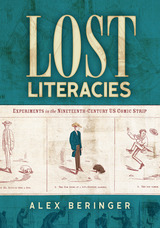302 scholarly books by University College London and 14
start with H
302 scholarly books by University College London and 14
302 scholarly books by University College London
14 start with H start with H
14 start with H start with H
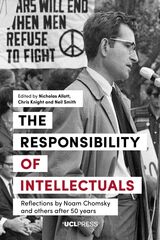
Happiness and Utility
Essays Presented to Frederick Rosen
Edited by Georgios Varouxakis and Mark Philp
University College London, 2019
Happiness and Utility brings together experts on utilitarianism to explore the concept of happiness within the utilitarian tradition, situating it alongside earlier eighteenth-century thinkers and working through some of its developments at the end of the nineteenth and beginning of the twentieth centuries. Drawing on a range of philosophical and historical approaches to the study of the central idea of utilitarianism, the chapters provide a rich set of insights into a founding component of ethics and modern political and economic thought, as well as political and economic practice. In doing so, the chapters examine the multiple dimensions of utilitarianism and the contested interpretations of this standard for judgment in morality and public policy.
The chapters are written in celebration of the career of Professor Fredrick Rosen. They follow his work by concentrating on Bentham and the two Mills, and by the subtleties and sophistication of their understanding of one of the most alluring but elusive ideas of modern times. The volume will be of interest not only to admirers of Rosen but to academics and postgraduate students in disciplines such as philosophy, political theory, the history of political thought, legal theory and legal history.
The chapters are written in celebration of the career of Professor Fredrick Rosen. They follow his work by concentrating on Bentham and the two Mills, and by the subtleties and sophistication of their understanding of one of the most alluring but elusive ideas of modern times. The volume will be of interest not only to admirers of Rosen but to academics and postgraduate students in disciplines such as philosophy, political theory, the history of political thought, legal theory and legal history.
[more]
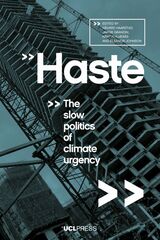
Haste
The Slow Politics of Climate Urgency
Edited by Håvard Haarstad, Jakob Grandin, Kristin Kjærås, and Eleanor Johnson
University College London, 2023
A powerful argument for not approaching climate change in a hurry, but with a slow politics of urgency.
It’s understandable that we tend to present climate change as something urgently requiring action. Every day we fail to act, the potential for catastrophe grows. But is that framing itself a problem? When we hurry, we make more mistakes. We overlook things. We get tunnel vision.
In Haste, a group of distinguished contributors makes the case for a slow politics of urgency. Rather than rushing and speeding up, he argues, the sustainable future is better served by our challenging of the dominant framings through which we understand time and change in society. While recognizing the need for certain types of urgency in climate politics, Haste directs attention to the different and alternative temporalities at play in climate and sustainability politics. Divided into short and accessible chapters, written by both established and emerging scholars from different disciplines, Haste tackles a major problem in contemporary climate change research and offers creative perspectives on pathways out of the climate emergency.
It’s understandable that we tend to present climate change as something urgently requiring action. Every day we fail to act, the potential for catastrophe grows. But is that framing itself a problem? When we hurry, we make more mistakes. We overlook things. We get tunnel vision.
In Haste, a group of distinguished contributors makes the case for a slow politics of urgency. Rather than rushing and speeding up, he argues, the sustainable future is better served by our challenging of the dominant framings through which we understand time and change in society. While recognizing the need for certain types of urgency in climate politics, Haste directs attention to the different and alternative temporalities at play in climate and sustainability politics. Divided into short and accessible chapters, written by both established and emerging scholars from different disciplines, Haste tackles a major problem in contemporary climate change research and offers creative perspectives on pathways out of the climate emergency.
[more]
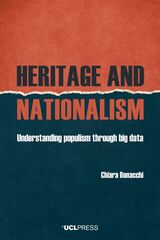
Heritage and Nationalism
Understanding Populism through Big Data
Chiara Bonacchi
University College London, 2021
An empirically grounded analysis of the repurposing of ancient and medieval European history in digital-age populism.
How was the Roman Empire invoked in Brexit Britain and in the United States during Donald Trump’s presidency, and to what purpose? And why is it critical to answer these kinds of questions? Heritage and Nationalism explores how people’s perceptions and experiences of the ancient past shape political identities in the digital age. It examines the multiple ways in which politicians, parties, and private citizens mobilize aspects of the Iron Age, Roman, and Medieval past of Britain and Europe to include or exclude others based on culture, religion, class, race, and ethnicity.
The book uses quantitative and qualitative methods to investigate how premodern periods are leveraged to support or oppose populist-nationalist arguments as part of social media discussions concerning Brexit, the Italian Election of 2018, and the US-Mexican border debate in the United States. Analyzing millions of tweets and Facebook posts, comments, and replies, this book is the first to use big data to answer questions about public engagement with the past and identity politics. The findings and conclusions revise and reframe the meaning of populist nationalism today and help to build a shared basis for the democratic engagement of citizens in public life in the future. The book offers a fascinating and unmissable read for anyone interested in how the past and its contemporary legacy, or heritage, influence our political thinking and feeling in a time of hyper-connectivity.
How was the Roman Empire invoked in Brexit Britain and in the United States during Donald Trump’s presidency, and to what purpose? And why is it critical to answer these kinds of questions? Heritage and Nationalism explores how people’s perceptions and experiences of the ancient past shape political identities in the digital age. It examines the multiple ways in which politicians, parties, and private citizens mobilize aspects of the Iron Age, Roman, and Medieval past of Britain and Europe to include or exclude others based on culture, religion, class, race, and ethnicity.
The book uses quantitative and qualitative methods to investigate how premodern periods are leveraged to support or oppose populist-nationalist arguments as part of social media discussions concerning Brexit, the Italian Election of 2018, and the US-Mexican border debate in the United States. Analyzing millions of tweets and Facebook posts, comments, and replies, this book is the first to use big data to answer questions about public engagement with the past and identity politics. The findings and conclusions revise and reframe the meaning of populist nationalism today and help to build a shared basis for the democratic engagement of citizens in public life in the future. The book offers a fascinating and unmissable read for anyone interested in how the past and its contemporary legacy, or heritage, influence our political thinking and feeling in a time of hyper-connectivity.
[more]
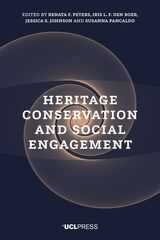
Heritage Conservation and Social Engagement
Edited by Rentata F. Peters, Iris L. F. den Boer, Jessica S. Johnson, and Susanna Pancaldo
University College London, 2020
Heritage Conservation and Social Engagement explores different kinds of engagement, participation, access, and creative use of resources motivated by the practice of conservation; and offers ethical and practical perspectives from which to approach cultural heritage projects by exploring the complexities of cross-disciplinary collaborations. Such collaborations are often influenced by the colonial baggage of museums, and their effectiveness can vary based on context, objectives, methods, and available resources. However, efforts to promote inclusion and engagement through museum collections and the broader heritage sector are becoming even more socially relevant. The heritage sector has tools and ability to help fight prejudices that are invariably based on misinformation or manipulation of facts, and this book joins those efforts, in the understanding that nothing can be done without dialogue and engagement.
[more]
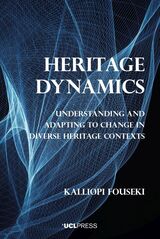
Heritage Dynamics
Understanding and Adapting to Change in Diverse Heritage Contexts
Kalliopi Fouseki
University College London, 2022
A systemic reconsideration of the formation and preservation of heritage.
As a sociocultural concept, heritage flows through cycles of emergence, change, disappearance, and revival. These lifecycles are influenced by heritage environments such as museums, landscapes, cities, and intangible networks of cultural circulation. In Heritage Dynamics, Kalliopi Fouseki develops a new theoretical and methodological framework that will enable heritage scholars and practitioners to unpack the ways and conditions under which heritage changes. Under the contexts of urban cities, residential buildings, museum collections, and subjects of intangible heritage especially concerning flamenco, this work re-orients the consideration of heritage as an object, process, or discourse, towards a more systemic thinking that captures the complexity of this historical-cultural force.
As a sociocultural concept, heritage flows through cycles of emergence, change, disappearance, and revival. These lifecycles are influenced by heritage environments such as museums, landscapes, cities, and intangible networks of cultural circulation. In Heritage Dynamics, Kalliopi Fouseki develops a new theoretical and methodological framework that will enable heritage scholars and practitioners to unpack the ways and conditions under which heritage changes. Under the contexts of urban cities, residential buildings, museum collections, and subjects of intangible heritage especially concerning flamenco, this work re-orients the consideration of heritage as an object, process, or discourse, towards a more systemic thinking that captures the complexity of this historical-cultural force.
[more]
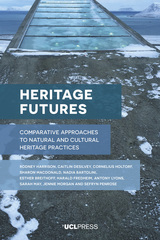
Heritage Futures
Comparative Approaches to Natural and Cultural Heritage Practices
Rodney Harrison, Caitlin Desilvey, Cornelius Holtorf, Sharon MacDonald, Nadia Bartolini, Esther Breithoff, Harald Fredheim, Antony Lyons, Sarah May, Jennie Morgan, and Sefryn Penrose
University College London, 2020
Preservation of natural and cultural heritage is often said to be something that is done for the future, or on behalf of future generations, but the precise relationship of such practices to the future is rarely reflected upon. Heritage Futures draws on research undertaken over four years by an interdisciplinary, international team of sixteen researchers and more than twenty-five partner organizations to explore the role of heritage and heritage-like practices in building future worlds. Engaging broad themes such as diversity, transformation, profusion and uncertainty, Heritage Futures aims to understand how a range of conservation and preservation practices across a number of countries assemble and resource different kinds of futures, and the possibilities that emerge from such collaborative research for alternative approaches to heritage in the Anthropocene. Case studies include the cryopreservation of endangered DNA in frozen zoos, nuclear waste management, seed biobanking, landscape rewilding, social history collecting, space messaging, endangered language documentation, built and natural heritage management, household keeping and discarding practices, and world heritage site management.
[more]
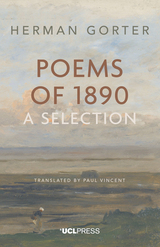
Herman Gorter
Poems of 1890: A Selection
Herman Gorter
University College London, 2015
Commonly viewed as a revolutionary and propagandist Herman Gorter (1864–1927) is often overlooked despite his lasting contribution to Dutch poetry. This selection of thirty-one poems, translated by Paul Vincent, focuses on Gorter’s experimental love and nature lyrics in Poems of 1890, and the Introduction sets the poems in the context of his earlier seminal work 'Mei' (May) as well as his often neglected Socialist verse. The lyrical expansiveness, consistent use of rhyme and vivid imagery of the Dutch landscape that characterises 'Mei' evolves into more fragmentary verse in Poems of 1890, and the joyful celebratory tone of Gorter’s poetry increasingly co-exists with a sense of isolation and introspection. This can be viewed in the context of a rapidly changing political scene in Europe in the prelude to the First World War and the Russian Revolution. This is a valuable collection that revisits Gorter’s literary and political legacy, and introduces English-speaking readers to a selection of his most accessible and lyrical poems
[more]
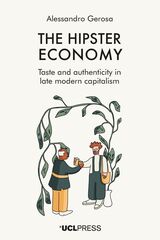
Hipster Economy
Taste and Authenticity in Late Modern Capitalism
Alessandro Gerosa
University College London, 2024
The Hipster Economy analyzes the impact of pursuing authenticity on consumption, urban spaces, and late modern capitalism, to offer a fresh perspective on hipsterism and aesthetic consumption.
The Hipster Economy gives hipsterism the serious analysis it deserves, through which he reveals the importance of hipster aesthetics, based on authenticity, for today’s consumption-based economy.
Since being authentic has become an aspiration and an imperative, the notion of authenticity shapes the consumption habits of individuals in the most diverse contexts such as food and drinks, clothing, music, tourism, and the digital sphere. It even transforms urban areas and their local economies. In this book, Alessandro Gerosa analyzes this complex set of related phenomena to argue that the quest for authenticity has been a driver of Western societies from the emersion of capitalism and industrial society to today.
The Hipster Economy provides a historically and sociologically grounded explanation of the value of authenticity in the contemporary economy and society, through which it shows why and how authenticity has become a fundamental value orienting consumers' taste in late modern capitalism. In clear and convincing writing, Gerosa proposes a novel conceptualization of the aesthetic regime of consumption and an analysis of how the hipster economy impacts the urban space.
The Hipster Economy gives hipsterism the serious analysis it deserves, through which he reveals the importance of hipster aesthetics, based on authenticity, for today’s consumption-based economy.
Since being authentic has become an aspiration and an imperative, the notion of authenticity shapes the consumption habits of individuals in the most diverse contexts such as food and drinks, clothing, music, tourism, and the digital sphere. It even transforms urban areas and their local economies. In this book, Alessandro Gerosa analyzes this complex set of related phenomena to argue that the quest for authenticity has been a driver of Western societies from the emersion of capitalism and industrial society to today.
The Hipster Economy provides a historically and sociologically grounded explanation of the value of authenticity in the contemporary economy and society, through which it shows why and how authenticity has become a fundamental value orienting consumers' taste in late modern capitalism. In clear and convincing writing, Gerosa proposes a novel conceptualization of the aesthetic regime of consumption and an analysis of how the hipster economy impacts the urban space.
[more]
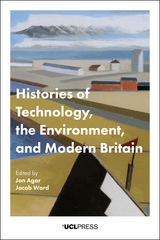
Histories of Technology, the Environment, and Modern Britain
Edited by Jon Agar and Jacob Ward
University College London, 2018
Histories of Technology, the Environment, and Modern Britain brings together historians with a wide range of interests to take a broad, multifaceted look at how technology and the environment have become intimately and irreversibly entangled in Britain over the last three hundred years. For the first time, the book brings together two perspectives with ample insights into the history of Britain since the Industrial Revolution: the history of technology and environmental history. Both technologies and our living and nonliving environment comprise material forms of organization—or self-organization—and both have changed over time, sometimes in intersecting ways. Among the technologies discussed in the collection are bulldozers, submarine cables, automobiles, flood barriers, medical devices, museum displays, and biotechnologies. Environments discussed include both places of natural beauty and pollution, bogs, cities, farms, land, and sea. The book explores this diversity and offers an integrated framework for understanding these intersections.
[more]

History and the Climate Crisis
Environmental History in the Classroom
Kate Hawkey
University College London, 2023
A case for including an environmental focus in the secondary school history curriculum by locating its arguments within established historiographical and revisionist debates.
History education has a key contribution to make in developing a deeper understanding of the current environmental crisis, but its role is too often overlooked. When embedded in the school curriculum, environmental history adds crucial layers of knowledge to the learning from other subjects and can enable students to make their own informed contributions to one of the most pressing concerns of the twenty-first century.
History and the Climate Crisis provides much-needed environmental knowledge, an area that is new for most history teachers. The author considers the disciplinary and pedagogical challenges and demonstrates how including an environmental focus can strengthen students’ disciplinary knowledge. She also builds her argument through many examples and offers practical strategies for use in classrooms, including developed inquiries suitable for the secondary history curriculum. The book focuses on environmental history within a strong subject-bound curriculum and will be relevant to teachers, academics, and policymakers in the United Kingdom and internationally.
History education has a key contribution to make in developing a deeper understanding of the current environmental crisis, but its role is too often overlooked. When embedded in the school curriculum, environmental history adds crucial layers of knowledge to the learning from other subjects and can enable students to make their own informed contributions to one of the most pressing concerns of the twenty-first century.
History and the Climate Crisis provides much-needed environmental knowledge, an area that is new for most history teachers. The author considers the disciplinary and pedagogical challenges and demonstrates how including an environmental focus can strengthen students’ disciplinary knowledge. She also builds her argument through many examples and offers practical strategies for use in classrooms, including developed inquiries suitable for the secondary history curriculum. The book focuses on environmental history within a strong subject-bound curriculum and will be relevant to teachers, academics, and policymakers in the United Kingdom and internationally.
[more]

A History of Scientific Journals
Publishing at the Royal Society, 1665–2015
Aileen Fyfe, Noah Moxham, Julie Mcdougall-Waters, and Camilla Mørk Røstvik
University College London, 2022
A comprehensive history of scientific publishing and its impact on scientific discourse.
Modern scientific research has changed significantly since the days of Isaac Newton, with professionalized, collaborative, and international networks that engage a more diverse community of researchers. Yet, the long history of scientific publishing reveals a deep mutual relationship between how academic discourse develops and what (and how) research is published. With unique insights from the Royal Society of London’s comprehensive archives spanning 350 years of scientific journal publishing, A History of Scientific Journals illustrates the entangled histories of scientific publishing and professional discourses. This volume provides insights into the editorial management, business practices, and financial difficulties of journals such as Philosophical Transactions, which was first published in 1665 and has published papers by Newton, Darwin, Dorothy Hodgkin, and Stephen Hawking. Highly illustrated with photographs of historic archived documents, including early publications and editorial annotations, this history extends to the present day and includes a look at digital journal publication and the open-access movement, making the book's publication through UCL Press both appropriate and symbiotic.
Modern scientific research has changed significantly since the days of Isaac Newton, with professionalized, collaborative, and international networks that engage a more diverse community of researchers. Yet, the long history of scientific publishing reveals a deep mutual relationship between how academic discourse develops and what (and how) research is published. With unique insights from the Royal Society of London’s comprehensive archives spanning 350 years of scientific journal publishing, A History of Scientific Journals illustrates the entangled histories of scientific publishing and professional discourses. This volume provides insights into the editorial management, business practices, and financial difficulties of journals such as Philosophical Transactions, which was first published in 1665 and has published papers by Newton, Darwin, Dorothy Hodgkin, and Stephen Hawking. Highly illustrated with photographs of historic archived documents, including early publications and editorial annotations, this history extends to the present day and includes a look at digital journal publication and the open-access movement, making the book's publication through UCL Press both appropriate and symbiotic.
[more]
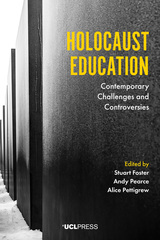
Holocaust Education
Contemporary Challenges and Controversies
Edited by Stuart Foster, Andy Pearce, and Alice Pettigrew
University College London, 2020
How do you teach children about the horrifying and systematic violence of the Holocaust? Especially when the very thing that makes it challenging—its intense and complex cruelty—also makes it so necessary to be taught?
Teaching and learning about the Holocaust is central to school curriculums across the globe. But the history of the Holocaust remains controversial and can render teaching it daunting, even to the most experienced instructors. Drawing on landmark research into teaching practices and students’ knowledge, Holocaust Education provides unique insights about classroom learning. It sheds light on key challenges in Holocaust education, including the impact of misconceptions and misinformation, the dilemma posed by images of atrocity, and how to approach teaching in ethnically diverse environments. Overviews of the most significant debates in Holocaust education provide wider context for the classroom evidence. Holocaust Education offers a vital guide, leading readers through some of the most vexed areas of Holocaust challenges and controversies for teachers, researchers, and policymakers.
Teaching and learning about the Holocaust is central to school curriculums across the globe. But the history of the Holocaust remains controversial and can render teaching it daunting, even to the most experienced instructors. Drawing on landmark research into teaching practices and students’ knowledge, Holocaust Education provides unique insights about classroom learning. It sheds light on key challenges in Holocaust education, including the impact of misconceptions and misinformation, the dilemma posed by images of atrocity, and how to approach teaching in ethnically diverse environments. Overviews of the most significant debates in Holocaust education provide wider context for the classroom evidence. Holocaust Education offers a vital guide, leading readers through some of the most vexed areas of Holocaust challenges and controversies for teachers, researchers, and policymakers.
[more]
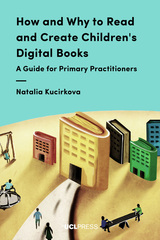
How and Why to Read and Create Children's Digital Books
A Guide for Primary Practitioners
Natalia Kucirkova
University College London, 2018
How and Why to Read and Create Children’s Digital Books outlines effective ways of using digital books in early years and primary classrooms, and specifies the educational potential of using digital books and apps in physical spaces and virtual communities. With a particular focus on apps and personalized reading, Natalia Kucirkova combines theory and practice to argue that personalized reading is only truly personalized when it is created or cocreated by reading communities. Part I suggests criteria to evaluate the educational quality of digital books and practical strategies for their use in the classroom. Specific attention is paid to the ways in which digital books can support individual children’s strengths and difficulties, digital literacies, and language and communication skills . Part II explores digital books created by children, caregivers, teachers, and librarians and offers insights into how smart toys can likewise enrich children’s reading for pleasure.
[more]
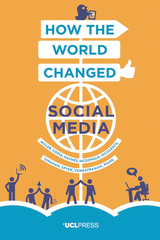
How the World Changed Social Media
Daniel Miller, Elisabetta Costa, Nell Haynes, Tom McDonald, Razvan Nicolescu, Jolynna Sinanan, Juliano Spyer, Shriram Venkatraman, and Xinyuan Wang,
University College London, 2016
How the World Changed Social Media is the first book in Why We Post, a book series that investigates the findings of anthropologists who each spent 15 months living in communities across the world. This book offers a comparative analysis summarising the results of the research and explores the impact of social media on politics and gender, education and commerce. What is the result of the increased emphasis on visual communication? Are we becoming more individual or more social? Why is public social media so conservative? Why does equality online fail to shift inequality offline? How did memes become the moral police of the internet? Supported by an introduction to the project’s academic framework and theoretical terms that help to account for the findings, the book argues that the only way to appreciate and understand something as intimate and ubiquitous as social media is to be immersed in the lives of the people who post. Only then can we discover how people all around the world have already transformed social media in such unexpected ways and assess the consequences.
[more]
READERS
Browse our collection.
PUBLISHERS
See BiblioVault's publisher services.
STUDENT SERVICES
Files for college accessibility offices.
UChicago Accessibility Resources
home | accessibility | search | about | contact us
BiblioVault ® 2001 - 2024
The University of Chicago Press


